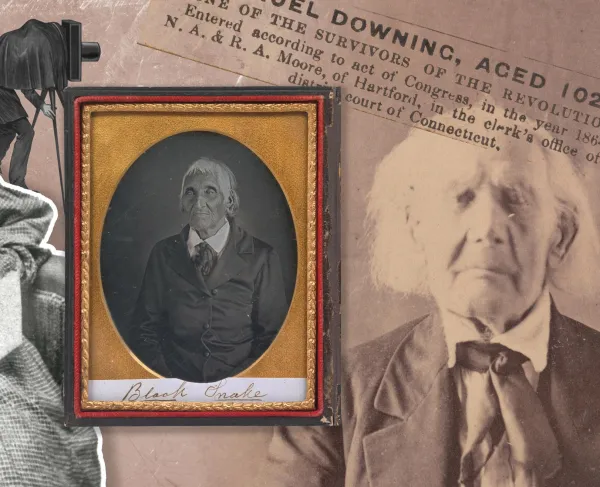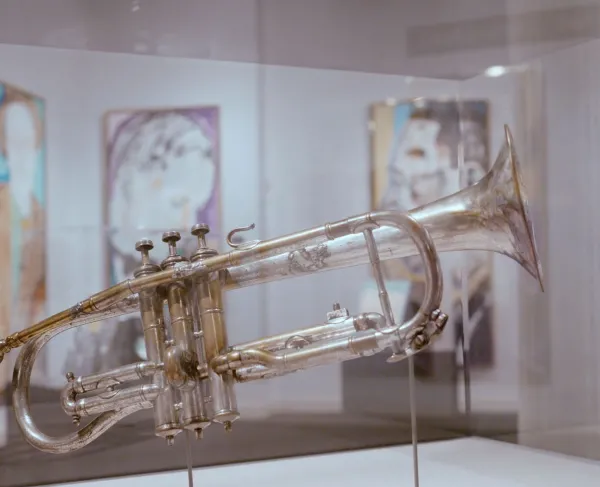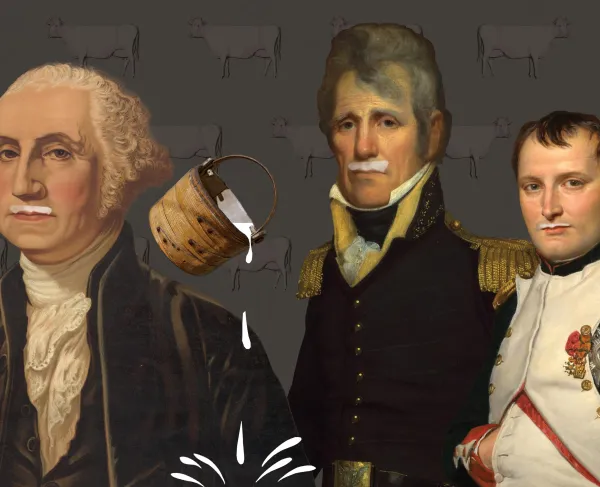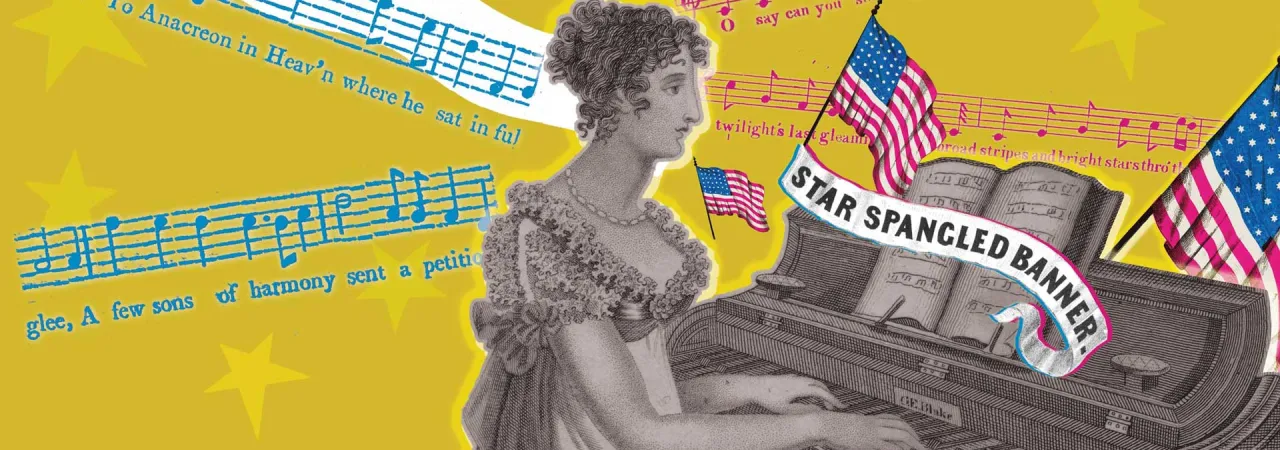
“It’s all been done/it’s all been done before….”
Barenaked Ladies (1998)
Think everything you hear on the radio is cutting edge, groundbreaking and original? Hardly. Chances are that the earworm you can’t quite shake includes at least some hint of an older song.
Moby’s Natural Blues (2000) includes a sample of B.B. King crooning “I’ve been downhearted, baby.” And sometimes it’s an even more overt ... err, homage. The Hollies’ classic “The Air That I Breathe” (1974) got revamped into Radiohead’s “Creep” (1992) — and then repurposed again by Lana Del Rey in “Get Free” (2017).
Explore the Playlist for this article:
But this is hardly a new phenomenon — borrowing tunes to make something our own has been going on for…well, for centuries. That quintessential olde timey ditty “Yankee Doodle” may have originated (melodically, at least) in medieval Europe. By the 1750s, it had morphed into a British drinking song that poked fun at less-than-sophisticated colonials. But Revolutionary Patriots turned that on its head by embracing and reclaiming the song as their own. (It’s been Connecticut’s official state song since 1978.)
Turns out that plenty of other Patriotic songs during the Revolutionary era also borrowed or repurposed older, well-known British tunes. But what might be called copyright infringement or plagiarism today (<glares at Radiohead>) actually made a lot of sense in an era before music could be reproduced en masse. Think about it: If you wanted to hear a song in the 18th century, you couldn’t pull up Ye Olde Spotify or (for those of us the right age to remember Napster and Limewire) illegally download a tune while tying up your household’s landline.
In the era before the “play” button, you had to hear someone play the song. Like, sit down and play the song. At a pianoforte. Or a violin. Or like, a fife. Live performances only. So once a tune got into the cultural zeitgeist, it tended to stick around and picked up lots of different lyrics as it evolved with the changing times — especially the times that tried men’s souls.
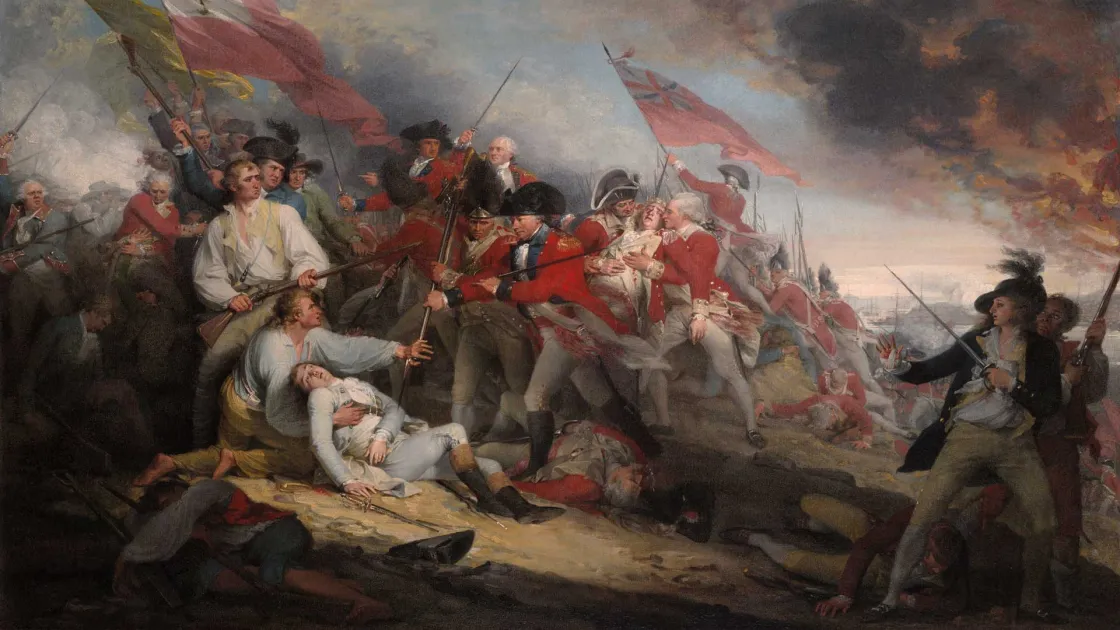
There’s lots of examples of this in early American music history. You know Dr. Joseph Warren? Yes, you do — John Trumbull featured him (…well…) in his famous painting of the Battle of Bunker Hill. An early adopter of the American cause, he remixed a popular marching tune of the time, “The British Grenadiers,” into something more patriotic to rally the colonial troops. The original march hyped up going into battle for king and country (“Those heroes of antiquity ne'er saw a cannon ball, Or knew the force of powder to slay their foes withal. But our brave boys do know it, and banish all their fears, With a tow, row, row, row, row, row, for the British Grenadiers.”) But that obviously didn’t suit the opposing side, so Warren retooled it as “Free America” to pump up the Patriots. Set to the same tune, voices now sang:
“Torn from a world of tyrants, Beneath this western sky, We formed a new dominion, A land of liberty; The world shall own we’re freemen here, And such will ever be, Huzza, huzza, huzza, huzza, For love and liberty!”
With lyrics like this, you’d hardly miss all that tea you’d thrown into the harbor.
Another one of the OGs of patriotic remixes is “The Liberty Song,” which borrows its melody from a British naval anthem called “Heart of Oak,” penned for a 1759 London pantomime called Harlequin’s Invasion. The lyrics celebrated the mighty power of the British Navy (which still uses this as its official march). But Pennsylvania Patriot John Dickenson adapted it in 1768 to protest the Townshend Act. Thanks to the power of the press, Dickenson’s new lyrics spread like wildfire as colonists up and down the East Coast grappled with their changing relationship to Parliament – and each other Dickenson captured the moment with his lyrics:
“Then join Hand in Hand brave Americans all, By uniting we stand, by dividing we fall; in so Righteous a Cause let us hope to succeed; for Heaven approves of each generous Deed. In Freedom we’re born, and in Freedom we’ll live!”
Of course the most high-profile example of repurposing a British tune for American patriotic purposes is our own national anthem, “The Star Spangled Banner.” Or as you would have queued it up on the jukebox in your local 18th-century pub, “To Anacreon in Heaven.” If you heard the original lyrics in 1775 when John Stafford Smith wrote the melody, you wouldn’t be standing up at attention with your hand over your heart. No, no. You’d be well into your cups, as they say, paying your tribute to Bacchus, the celebrated Roman god of wine and merriment. But though it might be the bane of vocalists everywhere now, the original tune was incredibly popular, and Francis Scott Key is only one of many to pen new lyrics for what was, by his time, a popular classic.
It’s not just melodies that get remixed. Today’s modern music scene is full of old timey instruments that harken back to earlier traditions. Bands like the Avett Brothers, The Decemberists, and Mumford and Sons (to name a few) are famous for instrumentation that echoes the popular music scene of the Civil War era-fiddles, banjos, and mandolins contribute to their iconic sounds. And there’s the storytelling, too. Scots-Irish immigrants brought to the colonies a rich tradition of ballads. These narrative-driven tunes tell stories that are often tragic, romantic…oftentimes both! The ballad “Barbara Allen” dates to the 17th century, but it was heavily covered in the mid-20th century by folk singers like Simon and Garfunkel, Pete Seeger, and Joan Baez. And it’s not just old lyrics getting new melodies — modern artists have also explored this storytelling tradition — take The Raconteurs’ “Carolina Drama,” or “The Mariner’s Revenge Song” by the Decembrists. New songs, really old traditions.
So now that you’re musically inspired and no longer feel like everything great has to be original, why don’t you make like Francis Scott Key and unlock your own inner musician? It’s time for YOU to try your hand at reimagining a song from the past. The American Battlefield Trust’s Songs of a Young Nation Competition is now live—and we’re asking you to create music that brings the past to life and resonates today. It’s your turn to get creative. Whether you put your own twist on a historic anthem, invent something new with an old timey sound, or write your own ballad about American history that inspires you today, no matter what you decide, we can’t wait to hear it! Learn more about the Songs of a Young Nation Competition here.
We’re ready to sing your praises as you make your own mark on American music history.
